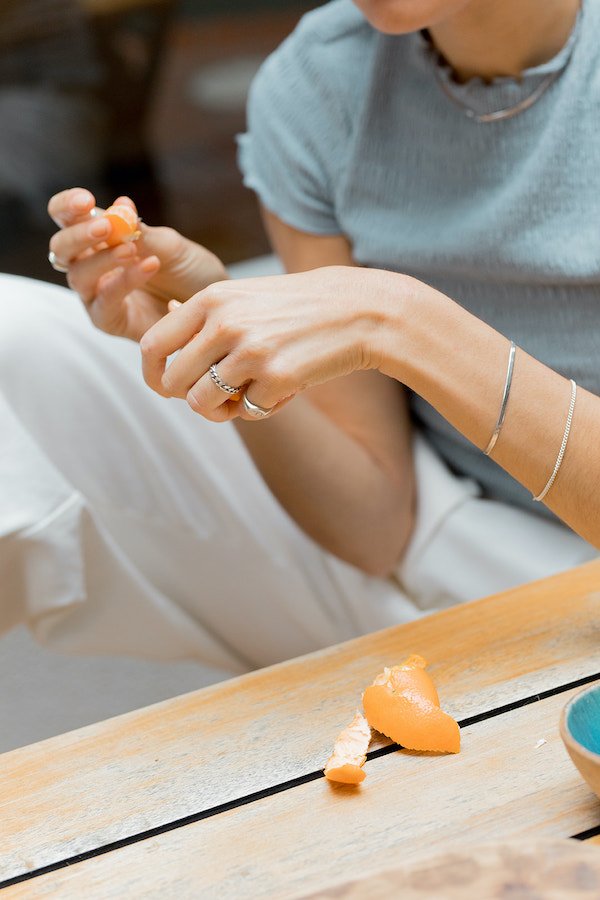
What I Wish I’d Known About Physical Intimacy After Cancer Treatments
I wore the same gray sports bra for almost two years. Originally, because it coddled my radiation-burned skin during early-stage breast cancer treatment. Later, because it was my bland armor against people associating my chest with anything sexual.
“I knew the fear of my body rotting from the inside out.”
In 2019, I had avoided a mastectomy in favor of a simpler lumpectomy. But my breasts? Traitors. It was their fault—one more than the other—I knew the fear of my body rotting from the inside out. They were the reasons I’d flashed dozens of strangers to be ogled, fondled, Sharpied, x-rayed, biopsied, sliced open, stitched closed, and zapped until my skin burned like charcoal catching the sun.
I learned to leave my body during examinations. Why would I stay? I would go scuba diving off the coast of Belize or snack on Iberian ham outside Barcelona. I “left” the same way when changing clothes at home: only in the closed-door bathroom, never near a mirror. And I didn’t return for anything romantic with my husband. Intimacy went as far as a rub on the shoulder or a kiss on the wrist. A surprise caress? Nope. I’d flinch and pull away so quickly I’d sometimes whack him.
“I learned to leave my body during examinations. Why would I stay?”
I am pray-to-God grateful I’ve stayed alive long enough to know that level of hypervigilance. And I realize, as does my therapist, that dissociating isn’t a healthy, long-term strategy. It’s just that I want to choose whether my body is evaluated and when and by whom. I’ve historically lacked a strong body image. Even so, there were parts I liked by my 30s, including my chest. The hottest I felt in the mirror was in something like slim black jeans and a sheer black bra. During the whole cancer thing, I couldn’t imagine looking through the lace to see evidence of illness—or admiring the mirror at all.
“I wish someone had prepared me for breaking up with my body as an act of self-preservation.”
I wish someone had prepared me for breaking up with my body as an act of self-preservation. Or told me I’d have to explain to my husband, through tears, that my brain couldn’t differentiate his loving gestures from a nurse swabbing me in the operating room. A touch was a touch. Touches were for sick people. And only my sports bra could touch me.
If you know the feeling—of leaving your body, losing your agency, wondering if you’ll ever have a romantic life as you knew it—then know you’re not alone. And, in time, know you can work on moving back into your own body, too.
Here’s what I wish someone had told me. And by the way, I’ve graduated to bralettes.
1. You might hate being touched, and not just around your “cancer area.”
Control and agency are big deals during intimacy. They’re also some of the first things I lost. I hadn’t chosen for my body to rebel and had no say in who was going to fondle me at any particular appointment. When you start associating touch with fear, even a brush on the arm can cause you to panic and pull away. My husband is supportive, but the flinching away hurts him. We developed go/no-go zones, and those change regularly. I’ve also adopted verbal warnings. Now I say, “I need my bubble” or “bubble bubble bubble” if I’m overstimulated. It’s a signal to halt with less perceived rejection.
2. You need to talk to your partner(s). Regularly.
“Just discussing my body has helped me feel more control over it.”
I’ve never been the person who thinks, “Hey, it’s Wednesday! Let’s talk about our love life!” But you have to discuss sex in detail if you want it as a component of intimacy. This might include ground rules for undergarments or scar visibility and the less obvious changes that treatments cause. I had to stop taking hormonal birth control, which took away daily doses of estrogen and progesterone. This meant reintroducing condoms (Skyn is my reco), adding more lube, and allowing more time to get in the mood. You might talk about mastectomies or other surgical changes, medication side effects, soreness and numbness, loss of libido, and so on. Just discussing my body has helped me feel more control over it.
3. Sex might be different, for a long time. Or always.
Full-on intercourse isn’t the only way to get romantic. Of course. The mental and physical impacts of disease might leave you feeling reserved, even when it comes to solo moments. You might want a break from your go-to’s. Creativity goes a long way. Maybe kissing, cuddling, or getting a massage become new forms of intimacy. Don’t think of them as less-than. Concentrate on how your body feels and responds. If you enjoy something, then stay in that moment. Introducing toys can be a good time, so check at a reputable sex shop or on online forums to see what others have liked.
4. You might want a coach.
If you bring up intimacy concerns with your oncology team or gynecologist, I bet it won’t be the first time they’ve heard them. I’ve been referred to a bodily trauma counselor and an intimacy coach, both of whom help people feel more in tune with their bodies. You can involve a partner or not, and a counselor or therapist could help, too. Check with insurance to see what’s covered. Some providers offer sliding fees.
5. You will probably panic.
Depression, lack of confidence, and a mind-body disconnect have randomly popped up since the cancer incident. In moments of intimacy, I can go from feeling it one second to having a flashback the next. Nothing like remembering a doctor saying, “here’s where the scalpel goes” to get in the mood. When I get scared, I say I need a second and decide whether things can continue. If the flashbacks are bad, I’ll say I need to stop. I might have a full-on panic attack, get teary, or calculate the odds of my husband leaving me. (For the record, couples who’ve faced cancer have the same divorce rates as those who haven’t.)
“A good partner will stay patient, listen, and help you through.”
There’ll be other opportunities for intimacy, and a good partner will stay patient, listen, and help you through. Losing the easiness of intimacy fundamentally changed the way my husband and I communicated, since even simple things like hugs got complicated. As my husband describes the pre- and post-cancer switch: “It wasn’t easy to retrain that part of my brain, and I still get it ‘wrong’ sometimes. I know my love for you transcends the physical, though, and while I do still need simple moments like random hugs, I’m always here for you.” Cue my tears.
“Your body and mind might do unexpected things trying to guard you.”
I appreciate that my body is strong again. I’m 37 and also appreciate that I (hopefully) have many years of intimacy ahead. I’ve just got Sports Bra Brain now.
There’ll be surprises as you exit crisis mode and reintroduce joy and fun again. Your body and mind might do unexpected things trying to guard you. If your protective-sports-bra equivalent makes you feel better, then I say do what you need to, as long as you’re not harming anyone. My gray bra’s still safe in the back of a closet.
Jill Hilbrenner is a writer based in Beacon, New York, where she owns the natural beauty and floral shop Witch Hazel. She lives with her husband, Mike, and two rescue dogs, Blanche and Suzy Lee.



